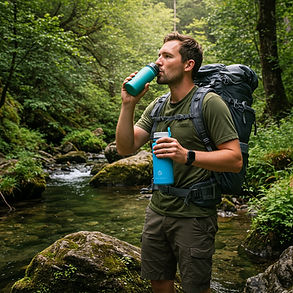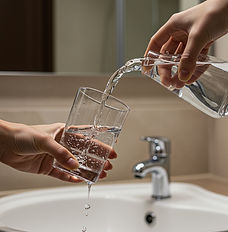Drinking Water in Greece: Safe Tap Water & Hydration Guide
Navigating Tap Water, Bottled Water, and Hydration for a Healthy Trip
Drinking water safety in Greece: Summary for Quick Reference
-
Tap water in major Greek cities like Athens and Thessaloniki is generally safe to drink and meets EU standards.
-
Water quality on islands and in rural areas can vary; bottled water is often recommended due to taste or local infrastructure.
-
Greece ranks among the top European countries for tap water safety.
-
Public fountains in some areas provide safe drinking water, but always verify.
-
Bottled water is widely available and affordable across Greece.
-
Staying hydrated is crucial, especially in Greece's warm climate.

Tap Water, Bottled Water and Hydration in Greece
Greece, a country steeped in ancient history and blessed with stunning islands and azure waters, attracts millions of visitors annually. As you plan your Greek adventure, understanding the safety and nuances of its drinking water is a key part of staying healthy and enjoying your trip to the fullest. While the allure of bottled water is strong, knowing when and where tap water is safe can enhance your experience and even be more eco-friendly.
Greek Drinking Water Safety: Your Essential FAQ
1. Is tap water safe to drink in all Greek islands, like Santorini and Mykonos?
While tap water in major cities like Athens is safe, on many islands (including Santorini and Mykonos), the water often comes from desalination plants. It's safe to drink but may have a brackish or salty taste. Many prefer bottled water.
2. How can I check if tap water is safe in my specific Greek destination?
Always ask your hotel staff or local residents for their advice. You can also look for signs indicating "potable water" (πόσιμο νερό) at public fountains. Official municipal websites sometimes provide water quality reports.
3. What are the risks of drinking unsafe water in Greece?
Drinking contaminated water can lead to traveler's diarrhea, which is the most common travel-related illness. While usually not serious, it can cause discomfort and dehydration.
4. Should I avoid ice cubes in Greece?
In areas where tap water is safe to drink (major cities), ice cubes are generally safe. On islands or in rural areas where bottled water is recommended, it's safer to avoid ice cubes unless you're sure they're made from purified water.
5. Is bottled water expensive in Greece?
No, bottled water is generally very affordable in Greece, especially when purchased from supermarkets. Prices typically range from €0.50 to €1.50 for a 1.5-liter bottle.
6. What are portable water filters or purification tablets, and do I need them in Greece?
These devices or chemicals can make unsafe water potable. While not typically needed in major cities or popular islands, they can be useful for hiking in remote areas or if you're concerned about water quality in very rural locations.
7. Can I get sick from brushing my teeth with tap water on the islands?
If the tap water is safe to drink, it's safe for brushing your teeth. If you find the taste unpleasant on an island, using bottled water for brushing is a good alternative.
8. How much water should I drink daily when traveling in Greece?
Aim for at least 8 glasses (about 2 liters) of safe water daily, and more if you are physically active, spending time in the sun, or experiencing hot weather.
9. What are oral rehydration salts (ORS) and why are they important for waterborne illness?
ORS are packets of salts and sugars that, when mixed with clean water, help your body quickly rehydrate and replenish electrolytes lost due to severe diarrhea or vomiting. They are crucial for preventing dehydration during illness.
10. How does Greece's water quality compare to other European countries?
Greece consistently ranks among the top countries in Europe for drinking water quality, with high compliance rates with EU directives, comparable to countries like Germany and Austria.

1. The Bottom Line: Greece's Water Quality
Greece consistently ranks among the top European countries for tap water safety, often scoring a perfect 100 in international reviews. This is due to modern water supply systems, advanced purification methods, and rigorous testing that ensures compliance with strict European Union (EU) Drinking Water Directives. In major cities like Athens and Thessaloniki, tap water is generally considered safe and reliable for drinking.
However, water quality can vary. While the mainland generally boasts excellent tap water, the situation on many islands and in remote rural areas can differ due to local infrastructure, water sources (including desalination plants), and geological factors.
2. Understanding Regional Variations: Mainland vs. Islands
The taste and sometimes the potability of water in Greece can vary significantly by region:
-
Major Cities (Athens, Thessaloniki):
-
Source: Primarily from large reservoirs and groundwater. Athens' water, for example, comes from Lake Marathon and undergoes extensive treatment.
-
Quality: Consistently safe and rigorously tested to meet EU standards.
-
Taste Profile: Generally good, though some may notice a slight chlorine taste, which is used for disinfection.
-
Traveler Tip: Feel confident drinking tap water here. Locals drink it freely, and it's commonly served in restaurants.
-
-
Greek Islands (e.g., Santorini, Mykonos, Crete, Corfu):
-
Source: Many islands rely on desalinated seawater or local groundwater wells, which can be limited.
-
Quality: While desalinated water is treated to be safe and meets EU standards, the taste can be different, often described as brackish or slightly salty.
-
Specific Islands:
-
Santorini & Mykonos: Largely rely on modern reverse osmosis desalination plants. The water is safe to drink but may have a distinct taste. Many hotels use additional filters to improve taste.
-
Crete: Tap water is generally safe, but its mineral content can be high, affecting taste. Some areas may experience seasonal shortages.
-
Corfu: Tap water is generally safe, but older infrastructure in some parts might lead to taste variations.
-
-
Traveler Tip: On islands, while tap water is often safe, many tourists and locals opt for bottled water due to taste preference. Always ask your accommodation or local residents for their advice.
-
-
Rural Areas:
-
Source: Often from local groundwater wells.
-
Quality: Can be less consistently monitored than in major cities. While often safe, there's a higher chance of variations in quality due to localized issues.
-
Traveler Tip: When in doubt in rural or remote areas, it's safer to stick to bottled water or use purification methods.
-
3. Navigating Drinking Water Sources: A Practical Guide for Travelers
Staying hydrated is key to enjoying your Greek adventure. Here's how to evaluate different water sources:
-
Tap Water in Your Accommodation & Restaurants:
-
Generally Your Safest Bet: In major cities and well-developed tourist areas, tap water is typically safe.
-
Taste Variations are Normal: Don't be alarmed by slight taste differences; it's usually due to harmless mineral content or chlorination.
-
When in Doubt, Just Ask: A simple "Είναι πόσιμο το νερό;" (Ee-nai PO-see-mo toh neh-RO? - Is the water potable?) to your server or hotel staff will provide reassurance. Many restaurants will serve tap water upon request.
-
-
Public Fountains (Vryses):
-
A Traveler's Friend (when marked safe): Many villages and historical sites have public fountains. Water from mountain springs is often excellent.
-
Proceed with Caution: Only drink from public sources explicitly marked as "potable" (πόσιμο νερό). Avoid those that look stagnant or are in poorly maintained areas.
-
-
Natural Springs & Untreated Sources: Proceed with Extreme Caution:
-
High Risk of Contamination: Unless explicitly marked as safe by local authorities with visible testing information, avoid drinking directly from natural springs, rivers, or lakes in remote areas. They can harbor harmful bacteria and parasites.
-
Boil or Purify if Necessary: In emergency situations during outdoor activities, boil untreated water vigorously for at least one minute (longer at higher altitudes) or use a reliable portable water filter or purification tablets.
-
-
Bottled Water: Convenience at a Cost (Environmental and Monetary):
-
Ubiquitous Availability: Bottled water is sold everywhere, from supermarkets to kiosks. Prices range from €0.50 to €1.50 for a 1.5-liter bottle.
-
Check the Seal: Always ensure the bottle is properly sealed before purchasing to avoid refilled bottles.
-
Consider the Planet: Opt for refilling a reusable bottle from safe tap water sources or well-maintained public fountains whenever possible to reduce plastic waste.
-
4. Smart Hydration Tips for Your Greek Trip
-
Carry a Reusable Water Bottle: This allows you to easily refill throughout the day.
-
Stay Hydrated, Especially in Summer: Greece can get very hot, so drink water regularly, especially during outdoor activities and intense sightseeing.
-
Observe Locals: You'll often see Greeks refilling their bottles at public fountains or drinking tap water, which can be a good indicator of local trust in water quality.
-
Be Prepared for Emergencies: Always have a backup plan for water, especially if traveling to rural or less developed areas.
Key Sources of Information:
-
World Health Organization (WHO): Provides global guidelines and recommendations for drinking water quality and safety.
-
European Environment Agency (EEA): Offers data and assessments on water quality across Europe.
-
Olympian Water Testing, LLC: Provides insights into Greek water quality and compliance.
-
Tappwater.co: Offers information on tap water safety in various countries, including Greece.
-
Greek Tourism Organizations & Local Municipalities: Provide specific information on local water supply and quality.
-
Travel blogs and forums: Offers insights from real-world traveler experiences.

